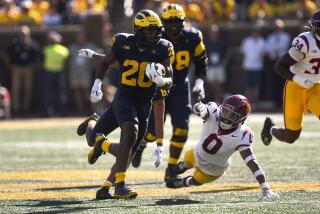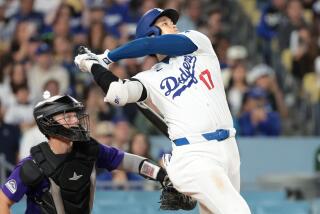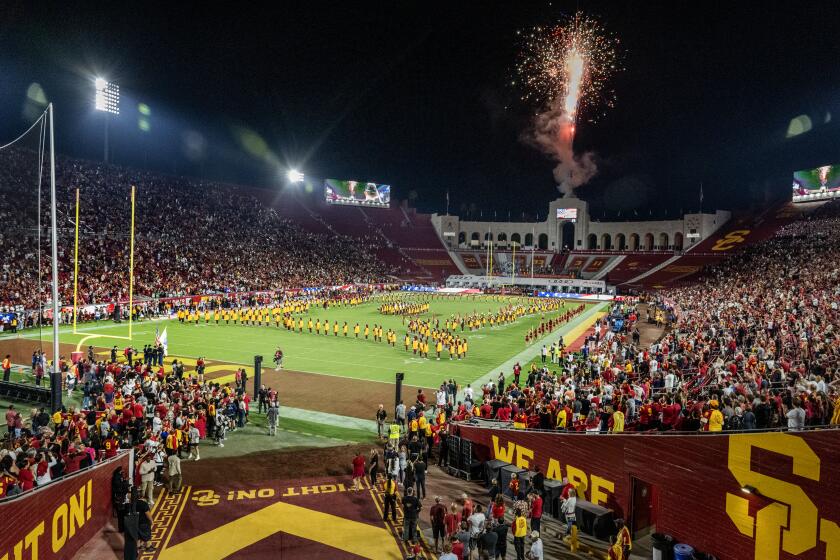Nothing Sounding Good to Padres in 6-2 Loss to Pirates
Padre bats have had the sound of silence recently, and since this is why the team lost another game Tuesday night, 6-2 to the Pittsburgh Pirates, it’s certainly worth investigating.
One problem could be that the sound hasn’t been silent at their hotels. Last weekend in Los Angeles and now in Pittsburgh, players have been given 8 a.m. wake-up calls from hammer-happy construction workers, who figure if they can’t sleep in, why should the Padres? And in Los Angeles one morning, Kurt Bevacqua says a helicopter flew right by his window, close enough that Bevacqua nearly waved at the pilot.
“But I didn’t know him,” Bevacqua said.
Anyway, since it is known that you have to open your eyes to hit a baseball, this lack of sleep could be causing the slump.
Still, there are better, more sound reasons for the Padre inability to score runs. Mainly, the problems come from leaving men in scoring position and pretty good pitching from the opposition.
These make more sense.
And if the Padres are to play this way, stranding runners all the time, they must continue to get good pitching themselves. They did not on Tuesday, LaMarr Hoyt giving up a first-inning, two-run home run to Jason Thompson and a two-run double to Steve Kemp in the sixth. That was that, and the Padres left for that hotel of theirs, their wake-up call ready in a matter of hours.
Still, at least there were runners to strand, which is saying something. Al Bumbry, a late starter for Carmelo Martinez (injured elbow), was partly the reason for that, singling three times and reaching on an error.
“I got on base, but I didn’t score,” Bumbry said. “ . . . That took something away from getting on base.”
And Bumbry did all this as the leadoff hitter, which was great because there’d only been one hit from a Padre leadoff man in eight games.
He singled in the first inning, and Manager Dick Williams had to say “Here we go” to himself. But Bumbry, being that he’s 38 years old now, was trying to get used to pitcher Rick Rhoden’s move to first base, and wasn’t even thinking about stealing. Williams wanted him to steal, but Williams doesn’t give signs to his runners, letting them go on their own.
Bumbry didn’t go.
“I could’ve jumped, but I didn’t feel comfortable,” Bumbry said. “You don’t just run for the sake of running.”
But Williams needs easy runs these days, needs stolen bases. From now on, he promised, he will order people to run, order a hit-and-run on occasion.
Still, the Padres didn’t lose because of that. In the fifth, San Diego trailed 3-2. With runners on first and third and one out, cleanup hitter Terry Kennedy, in one of his bad slumps and bad moods, came up and bounced a 2-2 pitch down to the first baseman Thompson, who wheeled and threw home, getting Bumbry at the plate. Kennedy keeps stranding runners.
Meanwhile, Hoyt had settled down after yielding three runs in the first. He retired 16 of the next 18 batters, not letting anyone get to second base. But George Hendrick and Tony Pena had consecutive singles, and up came Kemp.
Now, Kemp had played with Hoyt at Chicago, where they’d won ugly together, and Kemp remembered certain things. He remembered that Hoyt throws more breaking balls than fastballs. In the first inning, Hoyt had thrown first-pitch breaking balls to the first six hitters, so Kemp, up seventh in the first inning, made up his mind to go after a breaking ball. He grounded weakly to shortstop. But this time, with those runners on base, Kemp was much more selective and drove a sinker that never sunk to right-center field for a double.
“Yeah, I know him (Hoyt) fairly well,” Kemp said, “but I’ll tell you something about LaMarr . . . he’ll take the ball every fourth day, throw a lot of complete games for you, save your bullpen and he doesn’t walk people (though he gave up his first walk in 30 innings to Kemp, of all people).
“If he’s hit, he’s hit. He won’t cry about it.”
Right about that one.
“He got me this time,” Hoyt said of Kemp. “But that’s the first time. I get him next. But, you know, that’s life.”
Over in the Pittsburgh clubhouse, Al Holland was liking life, only because he’s in Pittsburgh and not Philadelphia. The Phillies didn’t like his adult (as opposed to baby) fat and traded him to the Pirates for a skinny guy (Kent Tekulve) because of it. So Holland is happy here, where he’s appreciated because he doesn’t throw fat pitches.
He threw four innings of scoreless ball Tuesday, earning a save.
“I get all my strength from my legs anyway,” said Holland, who likes his belly and who now can sleep at night, something the Padres would like to try.
Padre Notes
Sooner or later, the Padres and Alan Wiggins’ lawyers will come together and decide whether Wiggins will play again in San Diego. This will not be a league decision. By voluntarily entering a drug treatment center, Wiggins is secured under the league’s joint drug program. And consequently, when he’s finished with his treatment, the Padres and Wiggins’ lawyers will decide his future. But a problem surfaces if the two sides can’t reach an agreement. If they can’t, there will be an appeal to the Joint Review Counsel, made up of three doctors. The counsel then decides what to do with Wiggins, who can not be suspended unless he should need to be in a treatment center for more than 60 days. Said Don Fehr, executive director of the player’s association: “Theoretically, three days from now, if the club and Alan Wiggins come to the conclusion that he’s ready to play, there’s no stopping it.”
More to Read
Go beyond the scoreboard
Get the latest on L.A.'s teams in the daily Sports Report newsletter.
You may occasionally receive promotional content from the Los Angeles Times.










